外研版九下Module 7Unit 2We all own English精品ppt课件
- 格式:ppt
- 大小:3.61 MB
- 文档页数:8
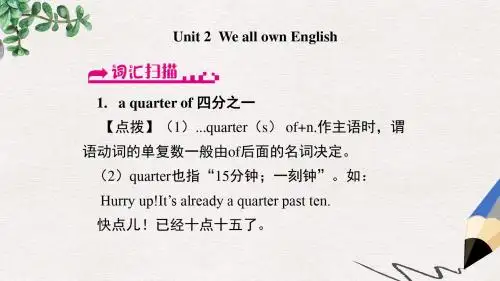
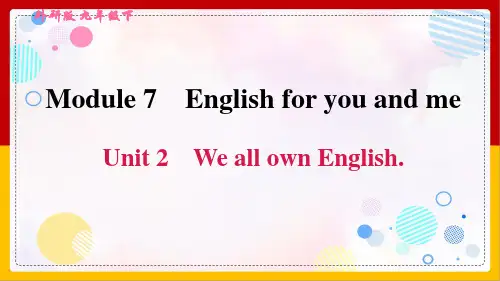
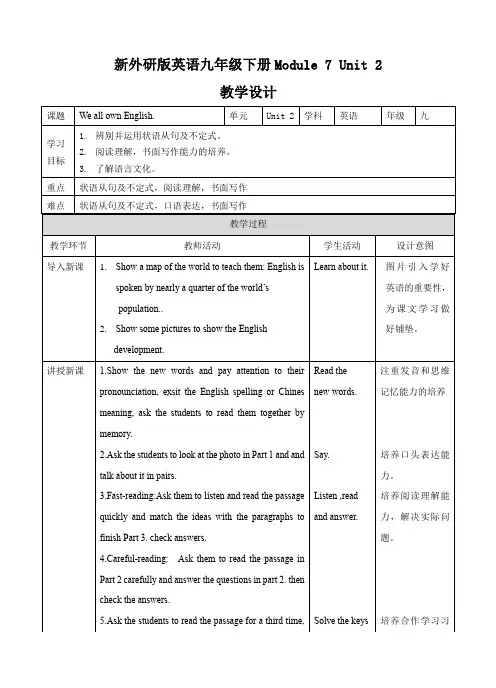
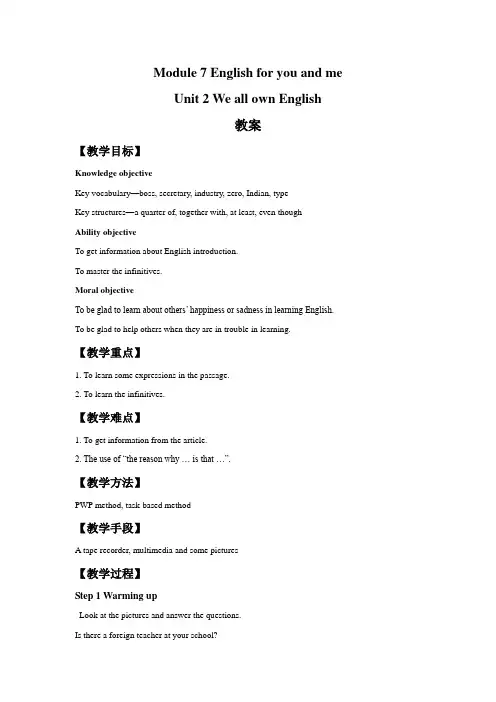
Module 7 English for you and meUnit 2 We all own English教案【教学目标】Knowledge objectiveKey vocabulary—boss, secretary, industry, zero, Indian, typeKey structures—a quarter of, together with, at least, even thoughAbility objectiveTo get information about English introduction.To master the infinitives.Moral objectiveTo be glad to learn about others’ happiness or sadness in learning English. To be glad to help others when they are in trouble in learning.【教学重点】1. To learn some expressions in the passage.2. To learn the infinitives.【教学难点】1. To get information from the article.2. The use of “the reason why … is that …”.【教学方法】PWP method, task-based method【教学手段】A tape recorder, multimedia and some pictures【教学过程】Step 1 Warming upLook at the pictures and answer the questions.Is there a foreign teacher at your school?Have you ever gone to an English corner at school?Did you meet foreigners when you went to places of interest?Is English spoken by most people in the world?Step 2 New wordsLook and say. The teacher shows the pictures of new words and let the students to say as quickly as possible.Step 3 Pre-readingWork in pairs. Talk about the photos on the right and on the next page to say where they are or what language you can see.Step 4 ListeningListen to Part 2 and answer the questions.1. Is English used as a working language?2. Where does English borrow “tofu” from?Step 5 Reading1. Read the passage and answer the questions.1) How many people in the world use English?2) How did English become an international language?3) When do you think Chinese will become an international language?4) Who owns English?Keys: 1) About 400 million people.2) In the nineteenth century, English became the language of world trade. And in thetwentieth century, the US spread English to the world through newspaper, televisionand films.3) By the middle of the twenty-first century.4) Everyone who speaks it.2. Match the ideas with the paragraphs.a) Chinese may be the next world language in the future.b) English is the most important international language today.c) English spread through trade and the media.d) We all own English.e) English has borrowed many words from other languages.Keys: 4, 1, 2, 5, 3Step 6 Complete the questions with the words in the box.Read the questions from the beginning to the end carefully.Choose the right words to fill in the blanks.1. Does a private ________ work for a manager or a teacher?2. Does a(n) ______ look after office workers or work alone?3. What are the people who live in _____ called?4. How many times does ______ appear in 1,000 and 1,000,000?5. If 1.75 billion is a(n) _______ of the world’s population, what’s the whole popu lation of theworld?Keys: secretary, boss, India, zero, quarterStep 7 Group workAsk and answer the five questions in pairs.1. Does a private secretary work for a manager or a teacher?2. Does a boss look after office workers or work alone?3. What are the people who live in India called?4. How many times does zero appear in 1,000 and 1,000,000?5. If 1.75 billion is a quarter of the world’s population, what’s the whole population of theworld?Step 8 Learning to learnLet Ss master the methods o f attracting readers’ attention.To attract readers’ attention, the writer often begins a composition with questions and then answers them. You can do the same when writing your own composition.Step 9 Language points1. English is now used by nearly a quarter of the world’s population.quarter 四分之一a quarter of ………的四分之一e.g. A quarter of the students are playing football on the playground.2. The reason why English is spoken everywhere is that in the nineteenth century, English became the language of world trade.The reason why … is that ………的原因是……e.g. The reason why he doesn’t come here today is that he is ill.3. Will the importance of English last?the importance of ……的重要性e.g. We all know the importance of studying.4. As China continues to grow, many people think that Chinese will become as common as English by the middle of the twenty-first century.as 随着……as … as… 和……一样…… 表原级比较e.g. The old man is as strong as a young man.5. More and more schools in Europe are teaching Chinese as a foreign language, together with some European languages.together with…与……一起,连同e.g. He collects coins, together with stamps and postcards.Mr Smith together with his son is going to Shanghai next week.6. Even though we speak different types of English, we all part of an international club.even though 虽然,尽管e.g. Even though he is excellent, he study hard.Step 10 WritingWrite a composition called The future of Chinese.Write notes about the following questions:How many people speak Chinese in China?How many people speak Chinese outside China? Where are they?Who is learning Chinese outside China?Do you think people will speak Chinese as an international language in the future? Why? Based on your notes, decide if Chinese will become more important in future. Write an introduction to state your point of view.Organize your notes into sentences and paragraphs. Use facts to support your opinions. Finish your composition with a conclusion.Step 11 HomeworkWrite a composition about how English became an international language.。
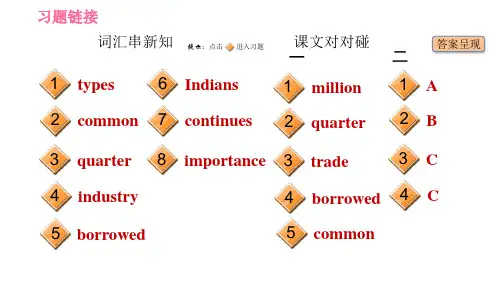
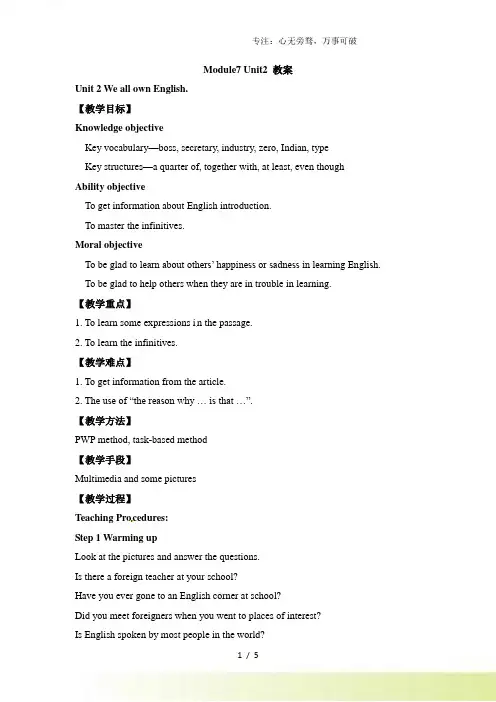
Module7 Unit2 教案Unit 2 We all own English.【教学目标】Knowledge objectiveKey vocabulary—boss, secretary, industry, zero, Indian, typeKey structures—a quarter of, together with, at least, even thoughAbility objectiveTo get information about English introduction.To master the infinitives.Moral objectiveTo be glad to learn about others’ happiness or sadness in learning English. To be glad to help others when they are in trouble in learning.【教学重点】1. To learn some expressions i n the passage.2. To learn the infinitives.【教学难点】1. To get information from the article.2. The use of “the reason why … is that …”.【教学方法】PWP method, task-based method【教学手段】Multimedia and some pictures【教学过程】Teaching Pro cedures:Step 1 Warming upLook at the pictures and answer the questions.Is there a foreign teacher at your school?Have you ever gone to an English corner at school?Did you meet foreigners when you went to places of interest?Is English spoken by most people in the world?Step 2 New wordsLook and say. T he teacher shows the pictures of new words and let the students say as quickly as possible.Step 3 Pre-readingWork in pairs. Talk about the photos on the right and on the next page to say where they are or what language you can see.Step 4 ListeningListen to Part 2 and answer the questions.1. Is English used as a working language?2. Where does English borrow “tofu” from?Step 5 Reading1. Read the passage and answer the questions.1) How many people in the world use English?2) How did English become an international language?3) When do you thi nk Chinese will become an international language?4) Who owns English?Keys: 1) About 400 million people.2) In the ni neteenth century, English became the language of world trade. And in the twentieth century, the US spread English to the world through newspaper, television and films.3) By the middle of the twenty-first century.4) Everyone who speaks it.2. Match the ideas with the paragraphs.a) Chinese may be the next world language in the future.b) English is the most important international language today.c) English spread through trade and the media.d) We all own English.e) English has borr owed many words from other languages.Keys: 4, 1, 2, 5, 3Step 6 Complete the questions with the words in the box.Read the quest ions from the beginning to the end carefully.boss India quarter secretary zeroChoose the right words to fill in the blanks.1. Does a private ________ work for a manager or a teacher?2. Does a(n) ______ look after office workers or work alone?3. What are the people who live in _____ called?4. How many times does ______ appear in 1,000 and 1,000,000?5. If 1.75 billion is a(n) _______ of the world’s population, what’s the wholepopulation of the world?Keys: secretary, boss, India, zero, quarterStep 7 Group workAsk and answer the five questions in pairs.1. Does a private secretary work for a manager or a teacher?2. Does a boss look after office workers or work alone?3. What are the people who live in India called?4. How many times does zero appear in 1,000 and 1,000,000?5. If 1.75 billion is a quarter of the world’s population, what’s the wholepopulation of the w orld?Step 8 Learning to learnLet Ss master the methods of attracting readers’ attention.To attract reader s’ attention, the writer often begins a composition with questions and then answers them. You can do the same when writing your own composition.Step 9 Language points1. English is now used by nearly a quarter of the world’s population.quarter 四分之一a quarter of ………的四分之一……e.g. A quarter of the students are playing football on the playground.2. The reason why English is spoken everywhere is that in the nineteenth century, English became the language of world trade.The reason why … is that ………的原因是……e.g. The reason why he doesn’t come here today is that he is ill.3. Will the importance of English last?the importance of ……的重要性e.g. We all know the importance of studying.4. As China continues to grow, many people think that Chinese will become as common as English by the middle of the twenty-first century.as 随着……as … as… 和……一样……表原级比较e.g. The old man is as strong as a young man.5. More and more schools in Europe are teaching Chinese as a foreign language, together with some European languages.together with…与……一起,连同e.g. He collects coins, together with stamps and postcards.Mr Smith together with his son is going to Shanghai next week.6. Even though we speak different types of English, we all part of an international club.even though 虽然,尽管e.g. Even though he is excellent, he study hard.Step 10 WritingWrite a composition called The future of Chinese.•Write notes about the following questions:How many people speak Chinese in China?How many people speak Chinese o utside China? Where are they?Who is learning Chinese outside China?Do you think people will speak Chinese as an international language in the future?Why?•Based on your notes, decide if Chinese will become more important in future.Write an introduction to state your point of view.•Organize your notes into sentences and paragraphs. Use facts to support youropinions.•Finish your composition with a conclusion.Step 11 Exercises1. The reason ____ you hear the sound first is that the sound travels faster than the light.A. thatB. whereC. whichD. why2. Mr Smith together with his students ____ having an English class.A. beB. isC. areD. am3. I know ____ two ways to improve your living situation.A. at lastB. at leastC. at firstD. at the end4. There are different ____ of food, help yourself.A. kindB. bagC. typesD. tasteKeys: D, C, B, CStep 12 HomeworkWrite a composition about how English became an international language.。
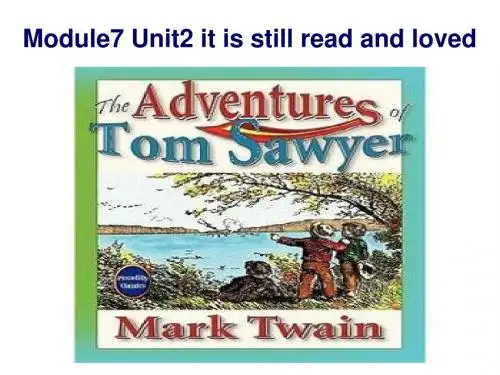
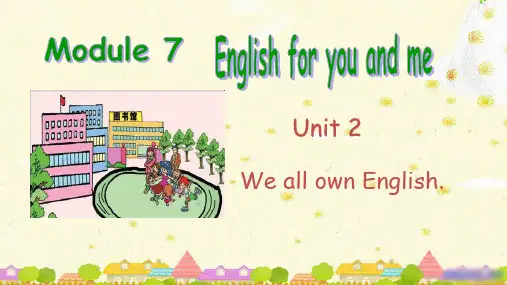
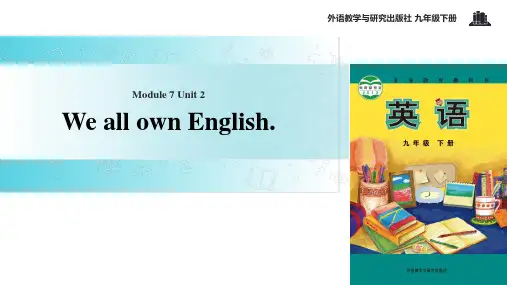
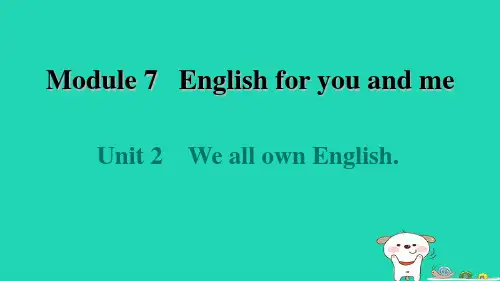
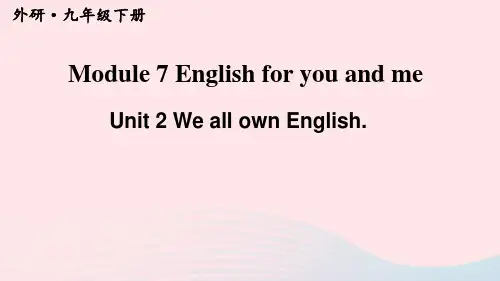
Module 7 Unit 2 We all own English指导思想与理论依据理论依据:分层教学与任务型教学参考书目:《新课程标准》《英语周报》教学背景分析本课讲的是西方的用餐习俗,内容涉及用餐时间、餐具、食物数量和如何结束等方面。
与实际生活紧密联系。
由于本班学生英语水平差,单词量少,所以结合本节课的特点采取学生自主学习的教学方式。
教材分析在21世纪的今天,越来越多的人走出国门,同时越来越多的外国朋友来到中国旅游、学习、和工作。
因此了解西方的用餐礼仪不仅是外语教学的任务也是时代提出的要求。
本课通过准备聚会食物的对话和介绍西餐用餐习惯的课文,帮助学生了解西方的饮食文化和用餐习俗,同时可以加深同学们对中国饮食文化的认识和理解。
教学重点、难点教学重点:1、Dinner is served around 7pm or even later.2 The fork is held in your left hand and the knife in your right, and the food is held with the fork and cut with the knife.教学难点:复习被动语态教学目标(内容框架)1、知识与技能:1) To get the general idea and specific information of thereading passage.2) To infer some information through analising the passage.2、过程与方法:Interactive approach3、情感态度与价值观:了解不同国家的饮食文化,学习西方饮食习俗中好的方面。
教学流程示意(可选项)Greeting---Lead-in---Pre-reading---Whilereading---Afterreading---Self-assissment---Summary---Homework---The end教学过程教学环节教师活动学生活动设计意图Step1、Greeting. Step2 Lead-in.Step3 Pre-eading Look at the pictures of Western meal.What things do you see at meal in China and what things are differen t..Step4 While reading.一、Completethe columnin the Westwith notes.1 Fast reading and Greetings.Show them the pictures and askthem to think “Are they right toeat Western food?”1 Show them some pictures aboutfood.2 Ask them to discuss thedifference.1 Show them the column and makesure they can undersand it.Greeting.Think and tellthe class theirideas.1 Discuss withpartner.2 Show theiranswers.1 Look at thecolumn.2 Read thepassage andfinish thisGreeting.Pay attentionto the details andpave the way forthe reading.Prepare for thereading.To understand themeaning of thepassage andfill in the blanks.2 Check thea nswers.二、Read the passage again and answer the following questions.1 Who is the passage written for?2 What is the tone o f the passage?3 Where might you see a passage like this?Step 5 After reading.Fill in the blankes according to the passage.Step 6Act in role. Step 7 2 Ask the Ss to read the passageand give them 10mins to finishthis part.3 Put them into 5groups and havethem disscuss their idears.1 Ask the Ss to read the q uestionstogether.2 Give them 5mins to finish thispart..1 Ask some students to read thesmall passage then give them somemins to fill in the blanks.2 Choose some students to telltheir answers and check themtogether.3 Have them read the passageloudly.4 Make sure they can understandit.1 Ask them to play in role.2 Choose some groups to show theirwork.part.3 Discuss withpartner and showthe idears.4 Check theanswers andcorrect them.1 Read thepassagetogether.2 Finish thispart bythemselves thencheck together.1 Read thepassage bythemselves.2 Fill in theblanks.3 Check theanswerstogether.4 Read itloudly.1 Practice withpartener.2 Show theirworks.practice thereading.Remember the keypoints.Make sure thestudents can usethe languepoints.Summary.了一段视频资料,让学生在笑声中轻松进入到本课主题,并且极大的调动了学生的积极性。
安徽外研版九年级下Module 7ꢀEnglish for you and me Unit 2We all own English.基础巩固练提示:点击进入习题答案呈现1type6twentieth7Indian 11C2 312B13C14D15D zeroboss8spread9to clean10to brush4secretary 5industry基础巩固练能力提升练答案呈现16is used as 17Even though 21A26B27C 2223AB18 19 20Together with282930ABC grow up24C25each other B能力提升练答案呈现31B 32C 3435At the age of 17.By giving them a test.33C36It was the most memorable part of thetrip.一、根据首字母及汉语提示完成单词。
1. Electricity is a t ype(类型) of energy that was discoveredover 100 years ago.2. It’s warm all the year round in Kunming. The temperatureerois always above z(零) even in winter.oss(老板) of the store; I mean he owns the 3. He is the bstore.ecretary4. The s(秘书) isn’t able to translate this businessletter into French.ndustry5. With the development of electronic i(工业),e-waste pollution has become a serious problem.二、用所给词的适当形式填空。